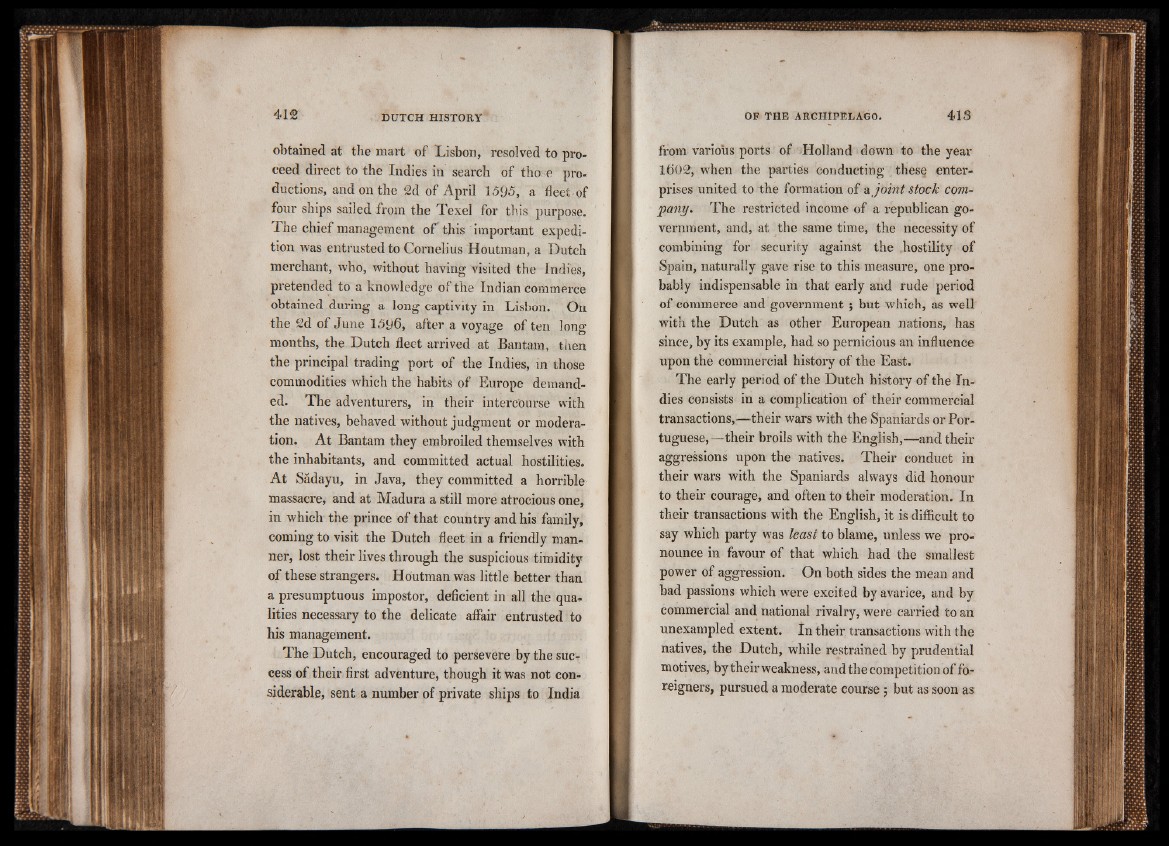
obtained at the mart of Lisbon, resolved to proceed
direct to the Indies in search of those productions,
and on the 2d of April 1595, a fleet pf
four ships sailed from the Texel for this purpose.
The chief management of* this important expedition
was entrusted to Cornelius Houtman, a Dutch
merchant, who, without having visited the Indies,
pretended to a knowledge of the Indian commerce
obtained during a long captivity in Lisbon. On
the 2d of June 1596, after a voyage often long
months, the Dutch fleet arrived at Bantam, then
the principal trading port of the Indies, in those
commodities which the habits of Europe demanded.
The adventurers, in their intercourse with
the natives, behaved without judgment or moderation.
At Bantam they embroiled themselves with
the inhabitants, and committed actual hostilities.
At Sâdayu, in Java, they committed a horrible
massacre, and at Madura a still more atrocious one,
in which the prince of that country and his family,
coming to visit the Dutch fleet in a friendly manner,
lost their lives through the suspicious timidity
of these strangers. Houtman was little better than
a presumptuous impostor, deficient in all the qualities
necessary to the delicate affair entrusted to
his management.
The Dutch, encouraged to persevere by the success
of their first adventure, though it was not considerable,
sent a number of private ships to India
from various ports of Holland down to the year
1602, when the parties conducting thesq enterprises
united to the formation of a joint stock company.
The restricted income of a republican government,
and, at the same time, the necessity of
combining for security against the .hostility of
Spain, naturally gave rise to this measure, one probably
indispensable in that early and rude period
of commerce and government ; but which, as well
with the Dutch as other European nations, has
since, by its example, had so pernicious an influence
upon thè commercial history of the East.
The early period of the Dutch history of the Indies
consists in a complicàtìon of their commercial
transactions,—their wars with the Spaniards or Portuguese,
—their broils with the English,—and their
aggressions upon the natives. Their conduct in
their wars with the Spaniards always did honour
to their courage, and often to their moderation. In
their transactions with the English, it is difficult to
say which party was least to blame, unless we pronounce
in favour of that which had the smallest
power of aggression. On both sides the mean and
bad passions which were excited by avarice, and by
commercial and national rivalry, were carried to an
unexampled extent. In their, transactions with the
natives, the Dutch, while restrained by prudential
motives, by their weakness, and the competition of foreigners,
pursued a moderate course ; but as soon as